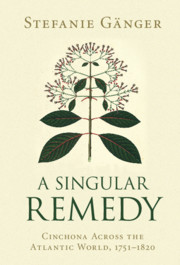Book contents
- A Singular Remedy
- SCIENCE IN HISTORY
- A Singular Remedy
- Copyright page
- Contents
- Illustrations
- Acknowledgements
- A Note on Source Material
- A Note on Language and Translation
- A Note on Weights, Currencies and Measures
- Introduction
- 1 Origin Stories
- 2 The Demands of Humanity
- 3 Community of Practice
- 4 Febrile Situations
- 5 Harvests of Change
- Conclusion
- Bibliography
- Index
Introduction
A Singular Remedy
Published online by Cambridge University Press: 02 October 2020
- A Singular Remedy
- SCIENCE IN HISTORY
- A Singular Remedy
- Copyright page
- Contents
- Illustrations
- Acknowledgements
- A Note on Source Material
- A Note on Language and Translation
- A Note on Weights, Currencies and Measures
- Introduction
- 1 Origin Stories
- 2 The Demands of Humanity
- 3 Community of Practice
- 4 Febrile Situations
- 5 Harvests of Change
- Conclusion
- Bibliography
- Index
Summary
By the late 1700s and early 1800s, cinchona bark was, to many, ‘the most important, and the most usual remedy that medicine possessed’. Though of limited repertoire – cinchona trees prospered only on the precipitous eastern slopes of the Andes at the time, in the Spanish American Viceroyalties of Peru and New Granada – and comparatively recent acceptance into Old World materia medica, the bark had, by the turn of the eighteenth century, woven itself into the texture of everyday medical practice in a wide range of societies within, or tied to, the Atlantic World. It was everywhere attributed ‘wonderful’, ‘singular’, even ‘divine’ medicinal virtues, the knowledge of which, so it was said, had come to mankind from its simplest, and humblest, specimens, ‘wild Indians’ close to nature and privy to its most coveted secrets. Bittersweet ‘febrifugal lemonades’ and bottled wines of the bark sat on the shelves of Lima apothecaries, the counters of Cantonese market stands and in the medicine chests of Luanda hospital orderlies. They were routinely concocted, and administered at the bedside, by Moroccan court physicians, French housewives and slave healers alike and they accompanied, tucked into their pouches, Dutch sailors to febrile environs, Peruvian soldiers to the battlefield and North American settlers westward. Scottish physicians, creole botanists and French writers alike were unanimous not only in according the bark ‘singularity’, and ‘the first place among the most effective remedies’ (die erste Stelle unter den würksamsten Arzneimitteln), but also in holding it to be ‘more generally useful to mankind than any in the materia medica’. It was commonly agreed upon that there was ‘no febrifuge of such well-known virtue in all of medicine’ (por que no se halla en la Medicina febrífugo de virtud tan conocida), and that not a single remedy ‘more estimable and precious [than the bark] had been discovered unto this day’.
Keywords
- Type
- Chapter
- Information
- A Singular RemedyCinchona Across the Atlantic World, 1751–1820, pp. 1 - 29Publisher: Cambridge University PressPrint publication year: 2020

